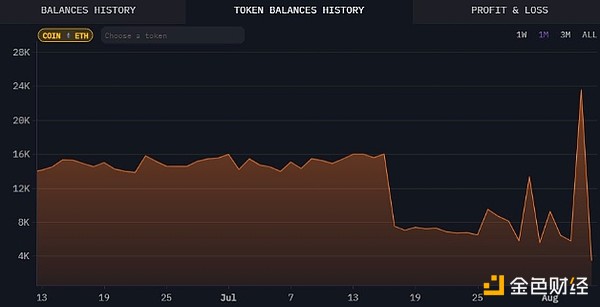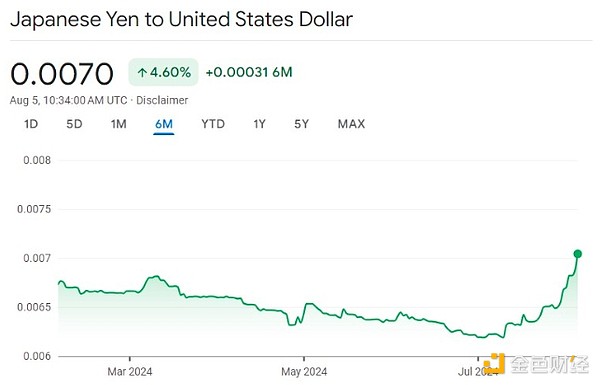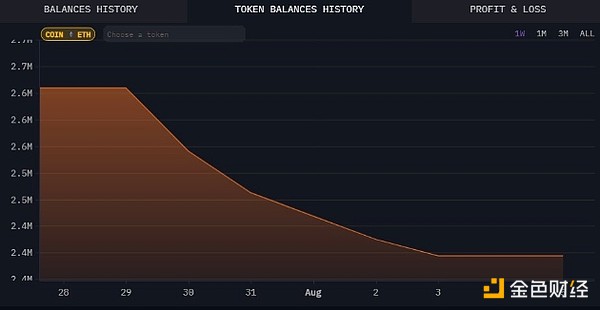Author: Yohan Yun, CoinTelegraph; Translated by: Tao Zhu, Jinse Finance
Jump Trading’s recent move to transfer hundreds of millions of dollars worth of Ethereum has sparked debate and market speculation.
This massive asset sell-off preceded Japan's historic stock market crash on August 5, when the Nikkei 225 index plunged 12.4%, or 4,451 points - the largest point drop ever.
Jump Trading recently moved approximately $315 million in staked Ethereum to cryptocurrency exchanges, with a large number of transfers occurring over the weekend.
Rumor has it that the trades could be part of a liquidation process as the proprietary trading firm prepares to wind down its cryptocurrency operations following the resignation of its former CEO amid an investigation by the U.S. Commodity Futures Trading Commission.

Jump Trading's Ethereum balance history. Source: Arkham Intelligence
Instead, some analysts believe the company may have anticipated the market downturn and moved quickly to convert its risky assets into stablecoins.
The Japanese stock market crash followed the Bank of Japan’s decision to raise its benchmark interest rate for the second time since March to its highest level in 15 years. This led to a sharp strengthening of the yen after it fell to a 38-year low against the dollar in June.
Mads Eberhardt, senior crypto analyst at Steno Research, noted: “In my opinion, the most plausible reason is that Jump Trading has been borrowing yen to finance its high-frequency trading business, perhaps to have sufficient liquidity or to acquire crypto assets, in other words, as a leveraged position.”
“Now, with the yen surging against the dollar, the cost of repaying the dollar-denominated loans has increased significantly, and their underlying collateral may have also taken a hit, [and] Jump Trading may have received a margin call on its loans.”
Meanwhile, on-chain data shows that other companies such as Grayscale have also recently sold large amounts of Ethereum, suggesting that the sell-off of Ethereum is not unique to Jump Trading.
Japan's 21st Century 'Black Monday' and Global Recession Fears
Analysts said Japan's historic stock market crash on Aug. 5, following disappointing U.S. jobs data last week, heightened fears of a global recession. The concerns are that the yen carry trade, a popular investment strategy due to historically low interest rates in Japan, may be coming to an end.
The carry trade involves borrowing money from a country with low interest rates and converting it into another currency to invest in an asset with a higher return.
“Most funds will borrow yen, convert it to dollars and then use it to buy dollar-denominated assets,” said Justin d’Anethan, head of business development for Asia Pacific at market maker Keyrock.

A stronger yen could be bad news for cryptocurrency investors, as institutional funds are tied to traditional markets. Source: Google Finance
The economic instability has led some experts to believe that companies involved in the yen carry trade are now in trouble.
According to Eberhardt, this may be the reason why companies such as Jump Trading are liquidating their assets.
“This could lead them to raise as much fiat as possible to pay back the loan. To do this, they would have to liquidate the most liquid bets, which could lead them to quickly liquidate hundreds of millions of dollars worth of Ethereum,” he said.
“I can’t find any other explanation why a well-respected trading firm would sell so much Ethereum in such a low liquidity environment when it should be clear that weekend crypto liquidity is extremely poor.”
Is the Jump trade sell-off part of a trend?
A check of its token balance history on Arkham Intelligence revealed that the company had been selling its Ethereum holdings since July 20, not over the weekend.
The company first moved more than 120,000 Wrapped Staked Ether (wstETH) from its Wormhole Counter-Exploit Funds address. The staked Ethereum in the wallet was reportedly recovered from the Wormhole bridge hack in February 2022, when $325 million was lost.
Activity at the address suggests that most of these funds have been withdrawn from Ethereum staking protocol Lido. According to Arkham Intelligence, one related address still holds about 37,600 wstETH.
Jump Trading is not the only company to see this trend. Other major investment firms, such as Grayscale and Paradigm, have also been liquidating their Ethereum positions.
“This disappearance of ETH is mainly caused by the capitulation of large funds,” DeFi Mochi commented on X.

Grayscale's Ether balance. Source: Arkham Intelligence
Data from Arkham Intelligence shows that Grayscale has sold nearly 600,000 ETH since July 24, when the Ethereum exchange-traded fund (ETF) was launched.
Against this backdrop, some see Jump Trading’s move as part of a broader strategy to reduce the risks posed by Japan’s market crash on Monday.
“They may just be savvy sellers,” Mikko Ohtamaa, co-founder of algorithmic trading firm Trading Strategy, told Cointelegraph.
Ohtamaa noted that signs of instability in the Japanese market have been building for weeks, giving macro traders plenty of time to prepare.
Jump Crypto may be shut down
Jump Trading’s recent Ethereum sales could be a sign of the company’s exit from the cryptocurrency market, according to rumors, following reports last month that the U.S. Commodity Futures Trading Commission (CFTC) had launched an investigation into the company.
Ohtamaa said the theory is that “they want to exit the cryptocurrency business, which is insignificant compared to their main business in the stock market.”
“For them, it’s not worth the regulatory risk,” he continued.

Source: Arthur Hayes
Even before the investigation, Jump Trading had faced numerous challenges in the cryptocurrency space.
In February 2022, the company's Solana Bridge Wormhole project was hacked, resulting in a loss of $325 million, and the company fell into market difficulties.
Additionally, the company has been linked to the Terra crash, where it was allegedly involved in key trading activities leading up to the crash, as well as the subsequent FTX crash, where it had significant exposure to the exchange.
The controversies have fueled speculation that Jump Trading is strategically exiting the volatile and increasingly regulated cryptocurrency market.
Summarize
There are two main theories regarding Jump Trading’s recent Ethereum sell-off. Some analysts believe it is more likely a response to margin calls triggered by economic conditions in Japan, while others claim it is the beginning of the end for the firm’s cryptocurrency division.
But analysts say it is not necessarily an either-or situation.
“But based on Jump’s expertise in the traditional space, it makes sense that they are very aware of FX moves and may have to preemptively protect or correct a carry trade against the yen, or just anticipate a market pullback,” said Keyrock’s d’Anethan.
“That could work out well, especially if they’re looking to reduce cryptocurrency activity — killing two birds with one stone,” he added.
Eberhardt pointed to this week’s flow data from U.S. bitcoin and ethereum spot ETFs, which will shed light on how traditional investors are responding to the plummeting markets.
“If ETFs see strong inflows this week, it could lead to a general sense of calm among crypto market participants, while if ETFs see outflows, the opposite would be true.”
The U.S. macroeconomic environment is also under close scrutiny amid concerns about an impending recession.







